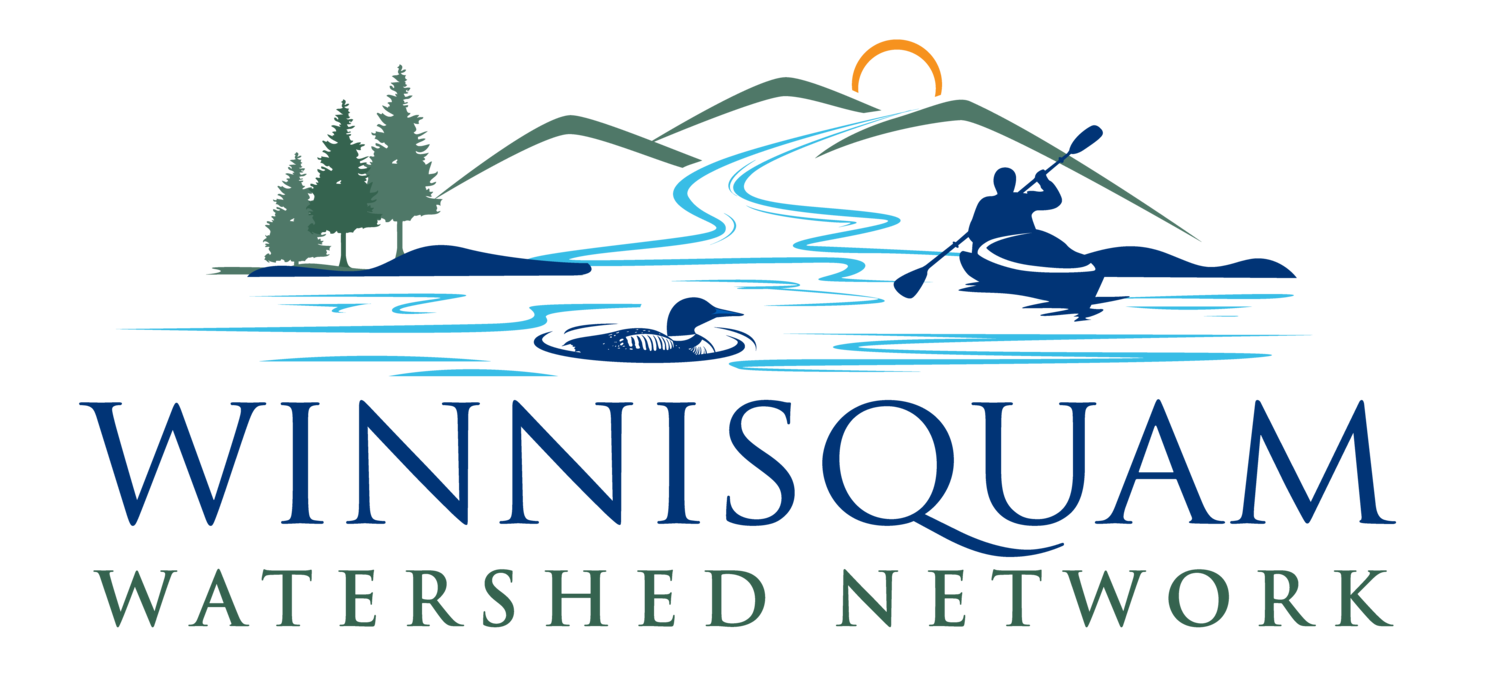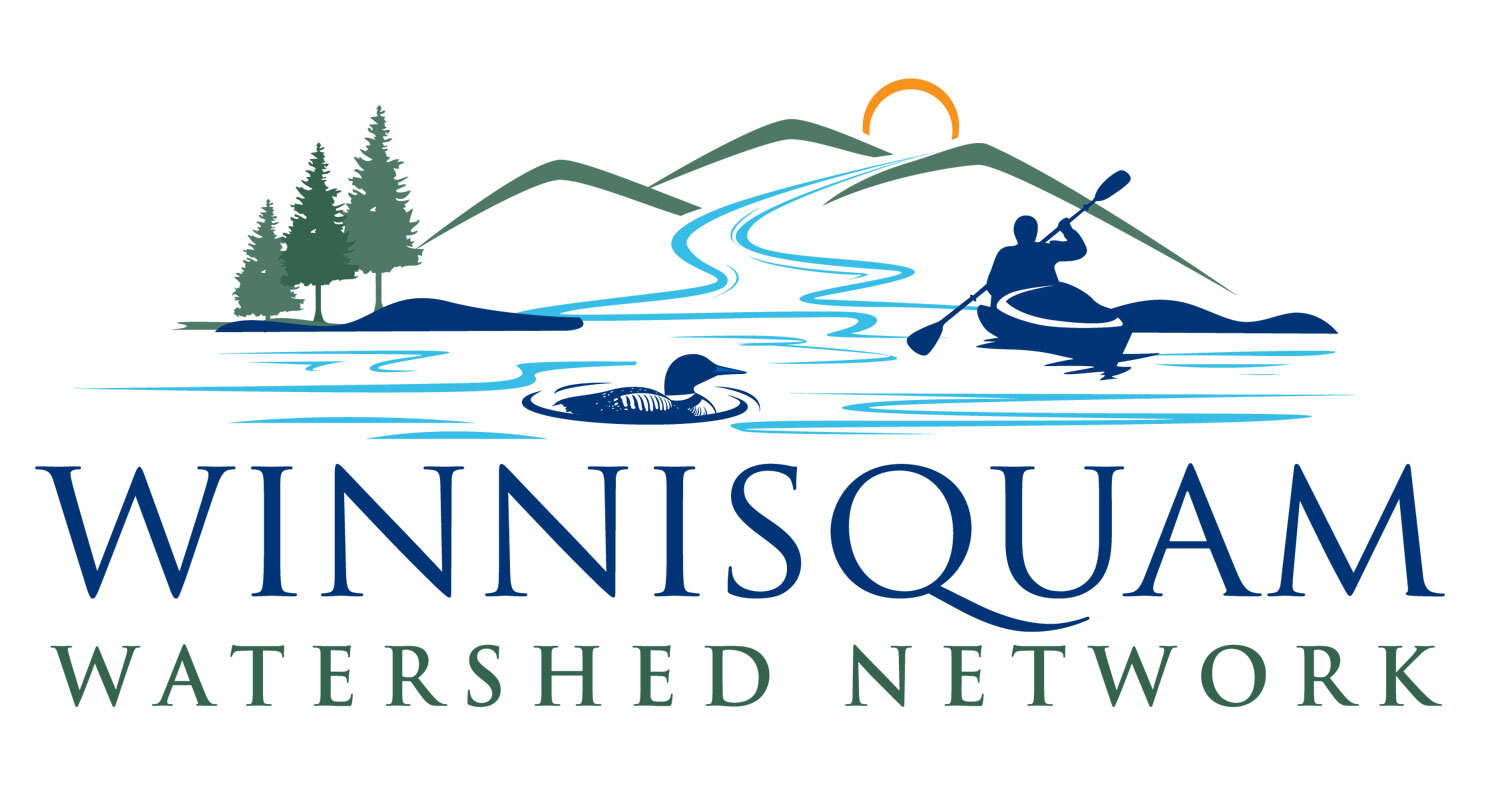
Be a Good Lake Steward
Our lakes are valuable and vulnerable, and in order to keep them healthy we as citizens must assume responsibility for their care. To be good lake stewards we must first recognize that our activities in the watershed, along the shoreline, and out on the lake itself affect the quality of the lake.
Although you might not live directly on the shore of a lake or stream, everyone lives in a watershed. A watershed is an area of land or a drainage basin that contributes water to a stream, lake, or other water body. Winnisquam’s watershed is a source of water to our lake but, without proper care, it can also be a source of pollution. During rain or snow melt events the runoff from the watershed flows over the land to the nearest stream or storm drain, taking with it soil particles, oil, salt, heavy metals, fertilizers and other contaminants. Those streams and storm drains eventually drain to the lake, so it’s important to recognize that even if you live miles away what you do on land can still affect the water quality in the lake.
Whether you live in the watershed or are just an occasional visitor to the lake you can help protect Lake Winnisquam by taking the following steps:
In the watershed:
Divert the flow of runoff water from driveways and roofs to rain gardens and other vegetated areas, allowing it to infiltrate the ground. The water will still make it to the lake, but it will carry fewer pollutants as it travels through the soil.
Install water bars or swales on unpaved driveways and pathways to keep them from eroding and washing sediment and nutrients into the lake.
Avoid using coal-tar sealcoat on paved driveways; the runoff is toxic to aquatic life.
Use deicing agents and sand on your driveway and walkways sparingly during the winter and sweep up the residue between storms and before the spring snowmelt to keep them from polluting the lake.
Never dump wastes into storm drains; they drain directly to local rivers and lakes.
Dispose of paints, batteries, and other household hazardous waste properly. The Lakes Region Planning Commission coordinates household hazardous waste collection events two weekends every summer. If you miss those you can also bring wastes to the Lakes Region Household Hazardous Products Facility in Wolfeboro.
Maintain and pump your septic system regularly to prevent failure.
Naturalize your landscaping. Opt for native trees, shrubs, and ground cover, as they’re already suited for the environment and require less water and fertilizer than non-native plants and lawns.
Leave or plant a dense vegetative buffer along the shoreline to help stabilize erosion-prone soils, filter runoff, and discourage ducks and geese from visiting the lawn.
The NH Shoreland Protection Act regulates the removal of ground cover, shrubs and trees within 150 feet of protected waters, including Lake Winnisquam. Check to be sure you are in compliance before doing any clearing by calling (603) 271-2147 or sending an email to shoreland@des.nh.gov.
Minimize lawn size and use fertilizers, pesticides and herbicides sparingly and in accordance with the NH Shoreland Protection Act. This means no fertilizers except limestone within 25 feet of the lake and only low phosphate, slow release nitrogen fertilizer or limestone between 25 and 50 feet from the lake. No pesticides or herbicides can be applied within 50 feet of the lake except by a licensed and permitted professional. For more information on proper lawn care within the protected shoreland check out this environmental fact sheet from NHDES: https://www.des.nh.gov/sites/g/files/ehbemt341/files/documents/2020-01/sp-2.pdf
Avoid dumping leaves or grass clippings in or near the lake as they add nutrients to the water. Do not burn brush or leaves on the ice or near the shore; the nutrients remain behind to runoff into the lake.
Beach construction or replenishment of beach sand is a regulated activity, as sand contributes phosphorus to the lake. Be sure to obtain a permit from the NH Department of Environmental Services Wetlands Bureau before building a beach or replenishing existing ones. For more information: https://www.des.nh.gov/sites/g/files/ehbemt341/files/documents/2020-01/wb-18.pdf
Remember – what we do on the land gets reflected in the water!
On the lake:
Avoid spreading aquatic invasives. Before and after boating always clean any visible plant fragments and mud off your boat, motor, trailer, and equipment and dispose of it in the trash. Drain your bilge, live-well and bait buckets, and be sure to dry everything thoroughly before you enter another waterbody.
Don’t throw any plant fragments pulled up on your anchor or fishing line back in the water or leave them where they can wash back into the lake. Just a small piece of an invasive plant can take root and spread.
Many products used to clean boats contain phosphates, chlorine and ammonia. Wash your boat frequently with a scrub brush or pressure washer and plain water to avoid buildup. If you must use cleaners opt for phosphate-free, biodegradable and non-toxic products and keep the rinse water out of local waterways.
Fuel your boat slowly and carefully. Attend the fuel nozzle at all times and know the capacity of your fuel tank.
Fill portable gas tanks on shore, not on the dock.
Keep the engine tuned and check for leaks. Change oil filters often.
Wipe up spills, don’t wash them into the lake.
Use oil absorbent pads or socks in your boat’s bilge. Avoid pumping bilge water that has an oily sheen.
Please respect our wildlife!
Winnisquam is home to an assortment of waterfowl as well as loons, herons, eagles and osprey. Please keep a respectful distance from nesting areas and do not harass or approach wildlife. Most summers Lake Winnisquam is home to both Loon chicks and eagle chicks. The loon chicks are frequently on the lake while the parents are diving for food. During the months of July and August keep a watchful eye for chicks as they’re not able to dive at this point in their life to avoid boats and predators.
Do not feed ducks or other waterfowl; there’s plenty of natural food available and feeding creates a nuisance and can lead to the spread of duck itch.
Get rid of your lead sinkers and jigs and switch to non-toxic tackle. See the Loon Preservation Committee’s information on the Lead Tackle Buy-Back Program. Every year multiple loons in NH die from ingesting lead fishing tackle they pick up off lake bottoms. Please help us protect the loons that make Lake Winnisquam their home.


